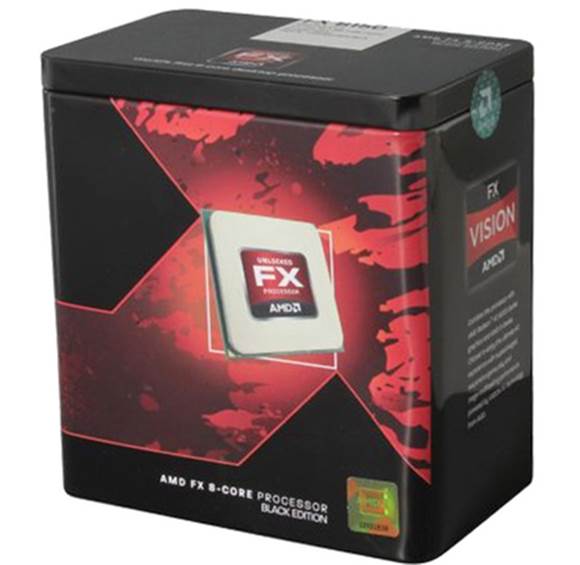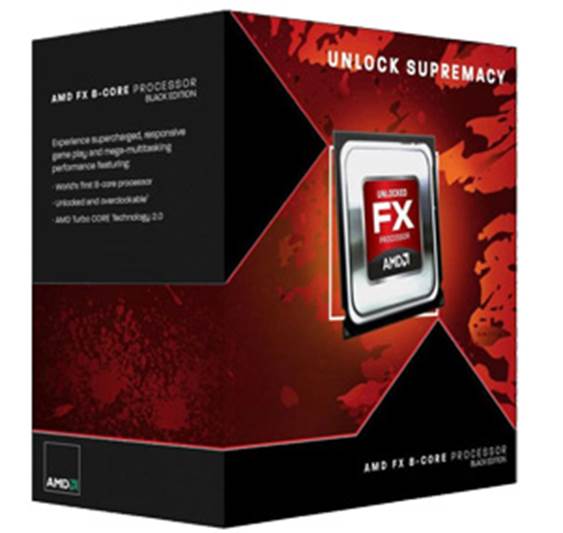When it was released, the AMD FX-8150
didn't have a chance against its direct competition, the Intel Core i5 2500K.
In fairness, no processor did. A couple of years on, things look a bit less
bleak for AMD's Bulldozer eight-cores. Mainly because of a massive price drop.
AMD's struggle against Intel's chips is
well-documented, but with better multi-threading and a lower price, is there
any reason to buy a Bulldozer chip instead of a Sandy or Ivy Bridge one? Or,
indeed, instead of a Piledriver-based chip?

AMD
FX-8150
In all honesty, it's hard to find one. When
the FX-8150 was AMD's fastest chip, there may have been a good reason. But now,
the slower Piledriver chip, the FX-8320, is actually better value. In a world
without Intel, this would have been worth owning, but in the real world it can
scarcely keep up with the Core i5 2500K. Once you account for overclocking,
it's actually much worse – especially for gaming, which is a strong driver of
sales for high-end CPUs. Piledriver's strengths lie in multi-threading thanks
to its eight physical cores, but there's not much call for that.
While the price drop has made the FX 8150 a
chip that's reasonably competitive, it's probably too late for AMD's battered
reputation to recover in any meaningful way. Bulldozer was supposed to be a big
leap forward for AMD, but instead it was a rather embarrassing stumble.
When gaming, the onboard graphics on
Bulldozer chips looks superior to the Sandy Bridge line's, but as soon as you
add a graphics card to take on that burden, the Intel chip races ahead. No
matter how you look at it, Intel chips do more, better, and usually for not
much more money.
At least the Bulldozer chips are good for
overclocking (you can even buy them at retail with water-coolers, presumably to
emphasise this). The problem is that overclockers are probably gamers – and
Bulldozer is many things, but a gaming platform is not one of them.
|
Details
·
Price: $216
·
Socket: AM3+
·
Clock Speed: 3.6GHz
·
Cache: L2/8MB
·
Process: 32nm
Ratings
·
Quality: 4/10
·
Value: 7/10
·
Overall: 6/10
|
Intel Core i7-2700K
The fastest Sandy Bridge CPU is still
competitive, with specs that rival its older Ivy Bridge sibling, the Core i7
3770K. But before you even start, there's one obvious problem: it's the same
price as the newer, more efficient processor. How can it compete with that?
The truth is, it can't. The i7 2700K might
have been the king of the Sandy Bridge generation, but its throne has been
stolen and there's no place left for a deposed monarch. Unless, of course, you
can't find a Core i7 3770K on sale, in which case it's the next best thing.

Intel
Core i7-2700K
In fact, even in its own time, the i7 2700K
was something of a pretender. Underneath it's the same quad-core 3.5GHz chip as
the i7 2600K, only clocked 100MHz faster. You could easily clock a 2600K at
3.5GHz using the default fan. Stick a decent cooler on both chips, and once you
get to overclocking you won't even notice the difference.
Like its predecessor, it completely
destroys the AMD Bulldozer chips, and even the much younger Piledriver CPUs
can't beat its performance in gaming, but the fact remains: there's no good
reason for this chip to exist anymore. It would be almost scandalous that
places were selling it full price, were it not for the even more scandalous
fact that they're often selling the i7 2600K for a couple of pounds more!
Don't get us wrong, it's a good CPU in
insolation, and we certainly wouldn't turn one down if it was given to us - but
it's really been hobbled by the progress of its line and Intel's own release
strategies. If the price were dropped even by £20, you could start making a
case for it – but when it costs virtually the same as its next-generation,
fully-compatible successor, it's time to give up trying. In its day, it just
about had a place – in the modern world, there's just no room for it.
|
Details
·
Price: $381
·
Socket: LGA1155
·
Clock Speed: 3.5GHz
·
Cache: L3/8MB
·
Process: 32nm
Ratings
·
Quality: 7/10
·
Value: 7/10
·
Overall: 7/10
|
AMD FX-8350
AMD's Piledriver line (which succeeds
Bulldozer) has been attempting to pull back ground from Intel since its
release, primarily through aggressive discounts. One of the few chips that can
even start to compete on performance grounds is this, the eight-core
(octo-core?) 4GHz AMD FX-8350.
Although AMD's chips can't really keep up
with Intel's in overall performance, the lowered prices make them worth
considering for budget system builders. It's far cheaper to pair a decent
motherboard and FX chip than it is to get a new Sandy/Ivy Bridge motherboard
and CPU, so especially if you're already in the AMD camp, there are benefits to
sticking with it. Financially, at least.
The single-threaded performance of
Piledriver chips is barely improved from that of the Bulldozer line, which was
famously poor. Most games are single-threaded tasks so, if you're building a
gaming system, that's likely to be a major concern - and the reason why Intel's
chips are so widely seen as superior in terms of single-thread processing,
which they very much are.

AMD
FX-8350
Multi-threading is better, although we're
not entirely convinced an eight-core design is much use, given how few programs
are likely to be capable of utilising eight cores simultaneously. Even so,
truly multi-threaded applications (things like video encoding) can be up to 25%
better than on Intel's Core i5 line, which comes in around the same price as
the FX-8350 CPU. Indeed, the multi-threaded performance is almost the same as
the Core i7-3770, which hyperthreads on four cores at a much higher price.
The problem is that such multi-threading is
only a small part of anyone's computing landscape. You won't get poor
day-to-day performance out of the FX-8350, but nor will you see its best with
any regularity.
It's also problematic that the FX-8350 is
actually worse value than its slightly slower line-mate, the FX-8320, which is
also better value than the FX-8150. So while this is AMD's fastest CPU right
now, we can't quite recommend it outright, even to AMD owners.
|
Details
·
Price: $241
·
Socket: AM3+
·
Clock Speed: 4GHz
·
Cache: L2/16MB
·
Process: 32mn
Ratings
·
Quality: 6/10
·
Value: 8/10
·
Overall: 7/10
|